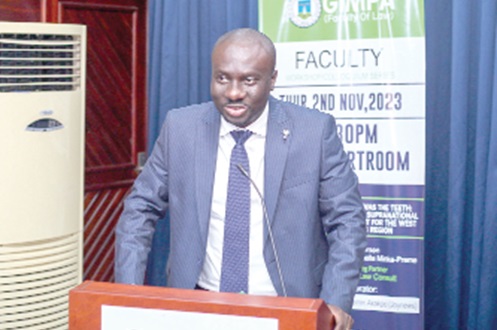
Give ECOWAS enforcement powers - GIMPA law lecturer to subregional leaders
A lecturer at the GIMPA Faculty of Law, George Baffour Asare-Afriyie, has called for the strengthening of the Economic Community of West African States (ECOWAS) as an organ with powers to enforce its decisions and policies in member states.
Advertisement
Proposing the transformation of ECOWAS into what he described as a supranational government, he said, it would make ECOWAS proactive with the power to sanction and reward its members.
Supranationalism is when a group of countries agree to cede some of their sovereignity and decision-making powers to a higher authority that transcends their national boundaries.
Mr Asare-Afriyie made the proposal when he delivered a paper titled “Giving ECOWAS the teeth: a case of a supranational government for the West Africa Region”, last Thursday, November 2, 2023 during the GIMPA Faculty of Law’s colloquium series and workshop in Accra.
The lecture, chaired by the Managing partner of Apex Law Consult, Sheila Minkah-Premo, attracted senior lawyers and judges, lecturers from GIMPA and other tertiary institutions, representatives of industry, students and some friends and family of the legal luminary.
ECOWAS with teeth
Mr Asare-Afriyie believes establishing a supranational ECOWAS will make it more efficient in promoting economic cooperation, peace and security, and political integration among its 15 member states.
To achieve this, he pointed out that the member states would have to make a conscious effort to cede part of their sovereignty to ECOWAS.
ECOWAS was established in 1975 to promote economic integration and cooperation among its member states and has since chalked up a number of achievements, including creating uniform human rights standards for member states, ending conflicts in member countries such as Sierra Leone and Liberia, and preventing the possible escalation of conflict in The Gambia.
Despite the goals and achievements of ECOWAS in terms of its treaties, conventions and regulations “it has been largely ineffective in achieving most of its objectives,” Mr Asare-Afriyie said.
So far, he said there had been a lack of political will among its member states to implement the decisions of the ECOWAS Commission or comply with the principles of the protocol on democracy and good governance.
Adopt EU model
To change the narrative, Mr Asare-Afriyie, using the European Union (EU) as a model, proposed the establishment of a supranational government for the West African sub-region which would involve the creation of a central authority with the power to make and enforce decisions on behalf of the member states.
The EU, he said, was considered the best shining example of supranationalism in history, because it had its own laws, policies, courts, parliament, currency and single market that affected many aspects of the lives of its citizens.
Describing the single market of the EU as its economic policy cornerstone, he explained that it was so because it allowed goods, services, capital and people to move freely between member states which had helped to promote trade and investment within the EU.
The EU additionally has developed a range of common policies to promote cooperation among member states such as a common agricultural policy that provides subsidies to farmers across the EU, while a common foreign and security policy coordinates foreign policy between member states.
With this, he said the member states were “compelled to put away their parochial interests in favour of that of the EU as decided by the organs of the EU. As a result, there is a greater fostering of unity and support among member states instead of states pursuing their interests at the expense of the greater community.”
“If ECOWAS does not want to create the supranational government with teeth to enforce the various outstanding protocols, rules, policies, among others, then I alternatively propose a total scrap of ECOWAS for the independent states to independently administer and deal with their issues” he said.
Thought provoking discourse
Ms Minkah-Premo commended the organisers for putting together the intellectual and thought-provoking discussions which to her would positively impact the sub-region.
She expressed the hope that the paper would be presented to ECOWAS and would contribute to transforming the thinking of governments, regional bodies and redirect the policies.
Countries in the sub-region, she said, had many similarities in terms of systems of governance “even with the food we eat, we are very similar,” emphasising that establishing a body with power to enforce policies would not be difficult.




